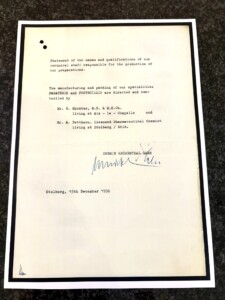The Irish Thalidomide Association (ITA) has uncovered evidence linking a Nazi doctor to official Irish health records from the 1950s, raising fresh questions about the State’s handling of one of the darkest medical scandals of the 20th century.
The revelations come as Virgin Media One re-airs the documentary Ireland’s Thalidomide Scandal tonight (Thursday) at 10pm to mark the first anniversary of its original broadcast.
At the centre of the new evidence is Dr Heinrich Mückter, a Nazi physician implicated in human experiments during World War II who later became head scientist at Chemie Grünenthal, the German pharmaceutical company that developed Thalidomide.

CHEMIE GRUNENTHAL STATEMENT FROM 1956 RE MUCKTER TO DOH
Documents in the National Archives show that in the 1950s, Mückter personally signed multiple statements for the Irish Department of Health, declaring himself the responsible technical officer overseeing the manufacture and importation of Grünenthal’s products.
These included penicillin and other medicines distributed in Ireland.
State files specifically relating to Thalidomide have never been released. The ITA says the new findings underline decades of State silence over its role in allowing the drug into Irish homes.
Thalidomide was widely marketed as a safe treatment for morning sickness but caused catastrophic birth defects, including missing limbs, internal damage, and hearing loss.
Globally, an estimated 90,000 pregnancies ended in miscarriage or stillbirth, while around 10,000 children were born with severe disabilities.
Half of those children died at or shortly after birth.
Around 40 survivors remain in Ireland today, all in their 60s and living with lifelong health challenges.
Campaigners say the State has still never published its report into infant deaths caused by Thalidomide in the early 1960s.
Although the drug was withdrawn internationally in November 1961, Ireland did not order a full recall and did not warn the public.
According to campaigners, Thalidomide products continued to sit in family medicine cabinets and even remained on pharmacy shelves for years afterwards.
ITA spokesperson Finola Cassidy said the discovery was disturbing:
“It’s hard to describe the sick feeling you get reading documents that could so easily have been buried forever.
“After 60 years of campaigning we deserve better, we deserve honesty, and basic human decency.”
ITA Chairperson John Stack said the evidence highlighted deep concerns about the role of the Irish State.
“The fact that Irish State files contain references to a known Nazi scientist raises fundamental questions.
“What did officials know at the time, and why have families been kept in the dark for so long?”
Thalidomide survivor Sharon Clarken said the lack of recognition added to the pain endured.
“Every day I live with the effects of Thalidomide. I’ve adapted and survived, but what hurts most is knowing the truth was buried.
“Acknowledging our story is not just about the past – it’s about dignity in the present.”
Sandra Dunne, representing survivors still unacknowledged by the State, added:
“We who have never been acknowledged are left to suffer denied recognition while the truth was hidden away.
“This isn’t just history – it’s about accountability today.
“The government owes us honesty, recognition, and action, not silence and further delay.”
The ITA says it will continue its fight for transparency, accountability, and justice for survivors and their families.